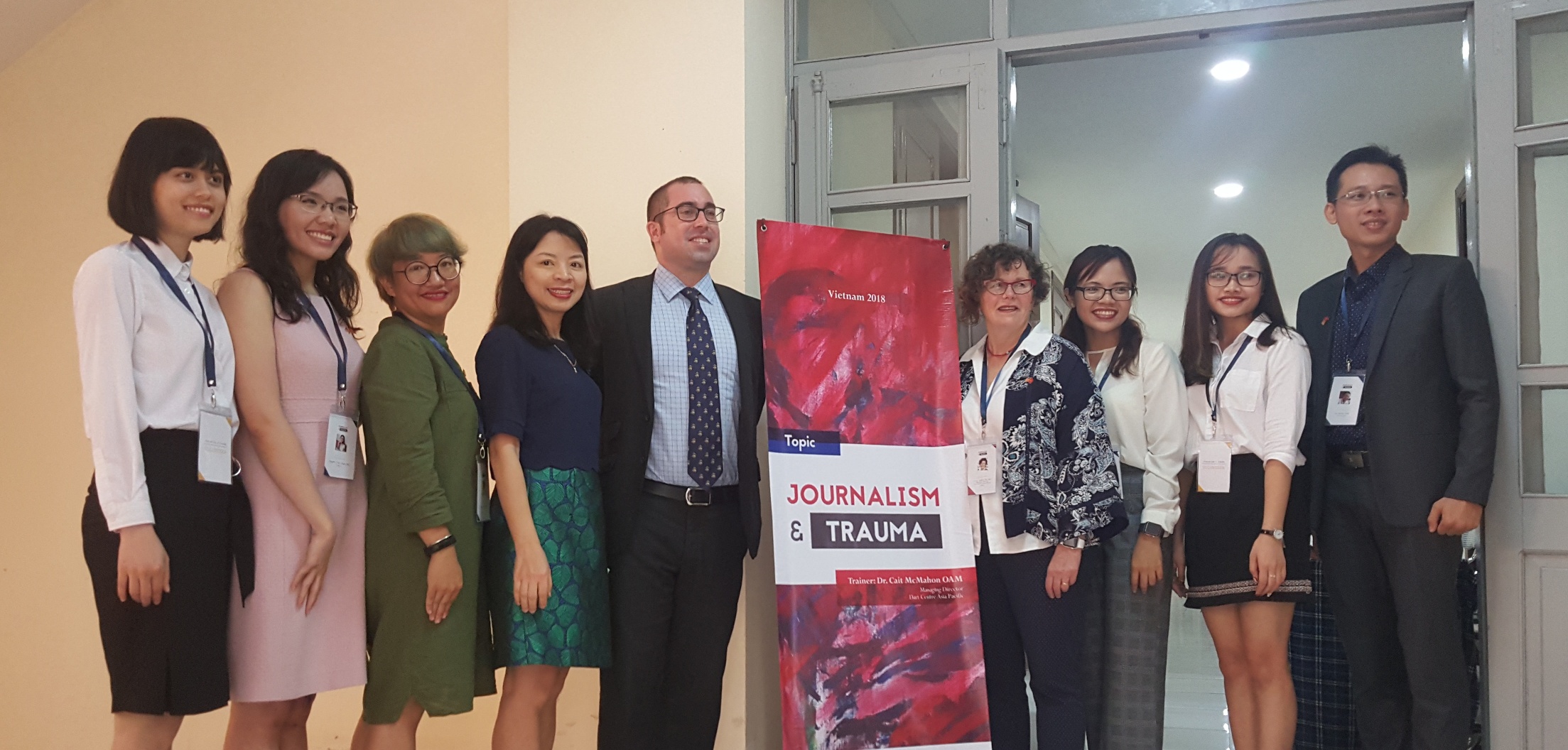The presentation was organized for reporters, journalists, and those working in the field of journalism and media in Vietnam, as well as students majoring in Journalism and Communication.
The presentation addressed the reality that psychological trauma during the course of journalistic work is a frequent issue, especially for journalists covering accidents, natural disasters, fires, wars, etc. Therefore, protecting oneself and minimizing mental harm during work is extremely important for journalists.

Dr. Cait McMahon - Founder and CEO of the Dart Asia Pacific Center
With her experience working regularly with journalists and helping them with psychological trauma, Dr. Cait McMahon shared with the attendees how to overcome these traumas, how to take care of themselves, cope with trauma, and navigate dangerous situations.
“Why are we discussing trauma, and how does this trauma relate to journalism? At Dart Centre, we have a great saying: ‘A healthy journalist produces quality journalism.’ And if you understand trauma, you will understand the terrible things the people you are reporting on or writing about have gone through,” Dr. Cait McMahon suggested.

Dr. Cait McMahon speaks with reporters, journalists, and media professionals in Vietnam.
During the presentation, the speaker explained and distinguished between two commonly confused concepts: "trauma" and "stress." "Trauma" refers to life-threatening or extremely violent events experienced firsthand or witnessed in others, and can even be influenced through online tools if the job involves it. This is what differentiates trauma from stress or prolonged discomfort. "Stress," on the other hand, typically occurs in daily life when encountering problems that exceed one's capacity to cope and respond. The impact of different levels of trauma, burnout, or stress leads to different mental health issues and treatments.
Reactions to traumatic events can be normal or abnormal, such as trembling, crying, stomach pain, headache, inability to concentrate, loss of confidence, nightmares, restlessness, anxiety, difficulty sleeping, and many other symptoms. These are defense mechanisms that affect brain structure and psychophysiological responses when the body is pushed into an alert state.

Dr. Cait McMahon interacts with students from the Faculty of Journalism and Communication.

Students from the Faculty of Journalism and Communication asked questions to the speaker.
“Even though you might think that interviewing someone who is suffering is probably inappropriate, you still have to go because of the assignment. And deep down, moral wounds will form, meaning you don't believe in what you're doing and you don't think it's right to do it. Interviewing a traumatized person is important, but deep down, according to your own moral standards, you'll feel that something isn't quite right,” the expert shared.
Dr. Cait McMahon argues that understanding psychological trauma will, firstly, help reporters choose more appropriate reporting methods. Secondly, it will help journalists convey messages more ethically and comprehensively. Therefore, the community will also gain a better understanding of the mental health issues that can be encountered in life.
“We wouldn’t send someone who doesn’t understand football to report on a match, so why would we send a reporter to cover disasters or traumatic events when they don’t understand injuries and their impact? Reporting is a very risky job; even while reporting, we may not realize we are experiencing psychological trauma. Research has shown that 80–100% of journalists will experience at least one event that has the potential to cause a serious traumatic reaction,” added Dr. Cait McMahon.

Associate Professor Dr. Dang Thu Huong (Head of the Faculty of Journalism and Communication) and Dr. Cait McMahon. The Faculty of Journalism and Communication is strengthening its cooperation in organizing seminars and presentations on operational issues in journalism and communication for Vietnamese reporters, journalists, and students majoring in Journalism and Communication.
Dr. Cait McMahon's speech attracted the attention and inspired many reporters, journalists, media professionals, and journalism and communication students. In particular, students from the University of Social Sciences and Humanities impressed the expert with their confident and fluent Q&A session in English on many issues of interest to young Vietnamese people, especially their personal stories about overcoming psychological trauma.
The presentation concluded with open-ended questions to encourage delegates and students to reflect on and define their meaning, goals, and mission in choosing journalism as a career, while also strengthening their resolve to pursue this future career.

|
A brief introduction to the expert- Dr. Cait McMahon
|
Author:Cong Hieu - Ngoc Tram
Newer news
Older news